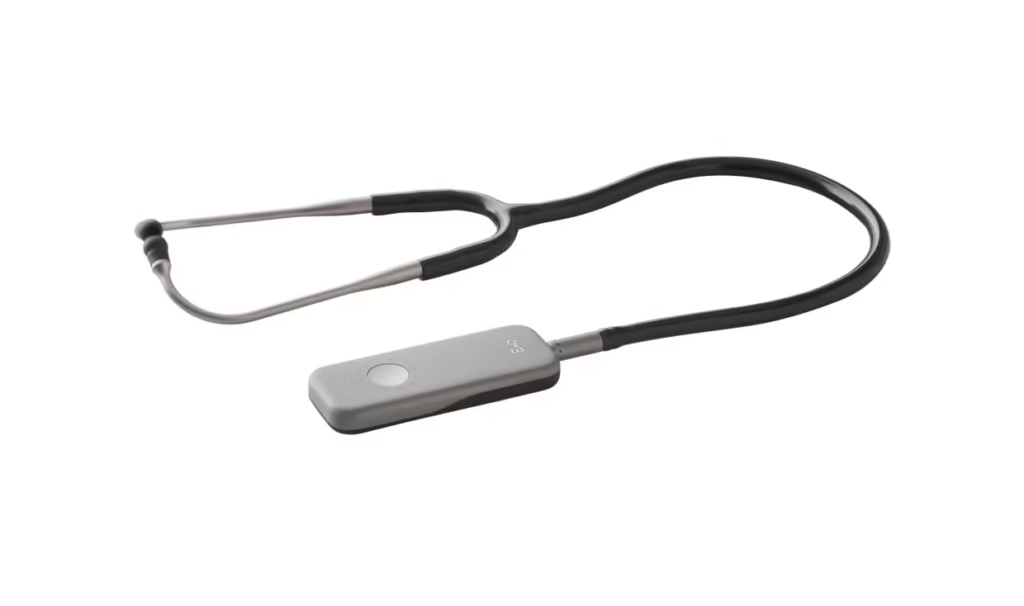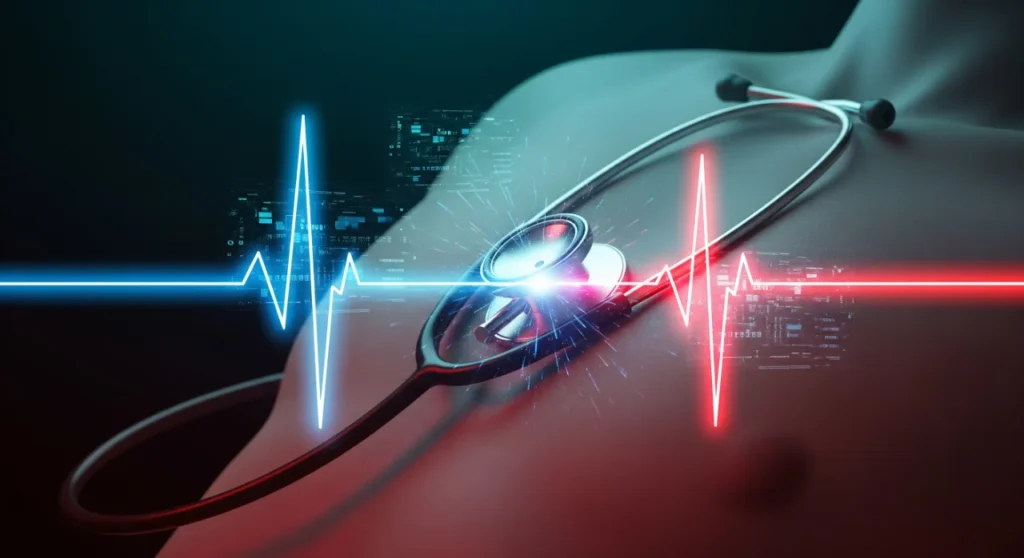Doctors in London have unveiled an AI-powered stethoscope that can spot deadly heart conditions in just 15 seconds.
The handheld device, trialled on more than 12,000 patients, could double diagnosis rates for heart failure and abnormal rhythms — potentially saving thousands of lives each year.
Key Takeaways
- AI stethoscope diagnoses heart conditions in as little as 15 seconds.
- Device doubles detection rates of heart failure in GP clinics.
- Works by combining ECG data and heart sounds, analysed in the cloud.
- Trial involved 12,000+ UK patients across 200 GP surgeries.
- Experts call it a “game-changer” but warn against overuse.
The AI stethoscope, developed by Imperial College London and Eko Health, can detect heart failure, valve disease, and atrial fibrillation in just 15 seconds. Tested on 12,000 UK patients, it doubled detection rates compared with standard care — offering earlier diagnoses that could prevent strokes and save lives.
A 200-Year-Old Tool, Reinvented
The stethoscope, first introduced in 1816, has long been a symbol of medicine. But for two centuries, its design barely changed. Now, researchers at Imperial College London and Imperial College Healthcare NHS Trust say they’ve reimagined it for the 21st century with artificial intelligence at its core.
The new AI-enabled stethoscope can detect three major heart conditions — heart failure, valve disease, and atrial fibrillation — in just 15 seconds. The findings were presented this week at the European Society of Cardiology Congress in Madrid, the world’s largest cardiology meeting.
How the Smart Stethoscope Works
Roughly the size of a playing card, the device — built by California firm Eko Health — is placed on the patient’s chest. It records an ECG to capture the heart’s electrical activity and simultaneously uses a microphone to track the sound of blood flow.
Both streams of data are sent to secure cloud servers, where AI algorithms trained on thousands of patient records analyse tiny abnormalities a human ear might miss. Within moments, results are sent back to a smartphone app, flagging whether a patient is at risk.
Inside the Numbers
In a UK trial of 12,725 patients across 200 GP practices, researchers compared clinics using the AI tool against those that did not. The results were striking:
- Patients were 2.3x more likely to be diagnosed with heart failure.
- 3.5x more cases of atrial fibrillation were detected.
- Valve disease diagnoses nearly doubled (1.9x increase).
Crucially, most participants presented with early warning symptoms such as breathlessness, fatigue, or swelling — signs often overlooked until patients reach emergency care.
Expert Insights
“The stethoscope hasn’t changed in 200 years — until now,” said Dr. Patrik Bächtiger of Imperial College London’s National Heart and Lung Institute. “This tool delivers results in seconds, giving GPs a way to catch problems earlier.”
Dr. Mihir Kelshiker, who co-led the study, stressed its potential: “Most patients with heart failure are only diagnosed when they arrive in A&E already seriously ill. With this, GPs could act before it’s too late.”
The British Heart Foundation and the National Institute for Health and Care Research (NIHR) jointly funded the project. NIHR innovation director Prof. Mike Lewis called the device “a real game-changer, bringing early detection into community care.”

Why It Matters
Heart failure, atrial fibrillation, and valve disease are among the leading causes of premature death worldwide. Earlier detection means earlier treatment — from prescribing blood thinners to prevent stroke to providing life-extending medications before the disease advances.
Dr. Sonya Babu-Narayan, medical director at the British Heart Foundation, noted: “An earlier diagnosis can mean patients live well for longer.”
Risks and Limitations
Like many AI tools, the breakthrough isn’t risk-free. Researchers caution against overuse, as the system carries a higher risk of false positives — flagging healthy patients as at-risk. The recommendation: restrict use to those already showing potential symptoms, not healthy populations.
The Bigger Picture
Beyond the UK, such devices could be transformative in low-resource settings, where cardiologists are scarce. A single handheld tool could empower community health workers to screen patients more effectively, catching diseases long before costly hospital admissions.
Still, experts warn that AI should augment, not replace, doctors’ judgment. The stethoscope is an aid, not a verdict.
What Happens Next
The trial results are being reviewed ahead of potential rollouts in South London, Sussex, and Wales. Broader adoption will depend on cost, training, and regulatory clearance. If successful, the AI stethoscope could soon become standard practice in GP offices worldwide.
Conclusion
The AI stethoscope is not just an upgrade — it could reshape how heart disease is diagnosed, moving care upstream and saving lives. If validated in larger studies, this 15-second test may prove one of the most important medical innovations of the decade.
